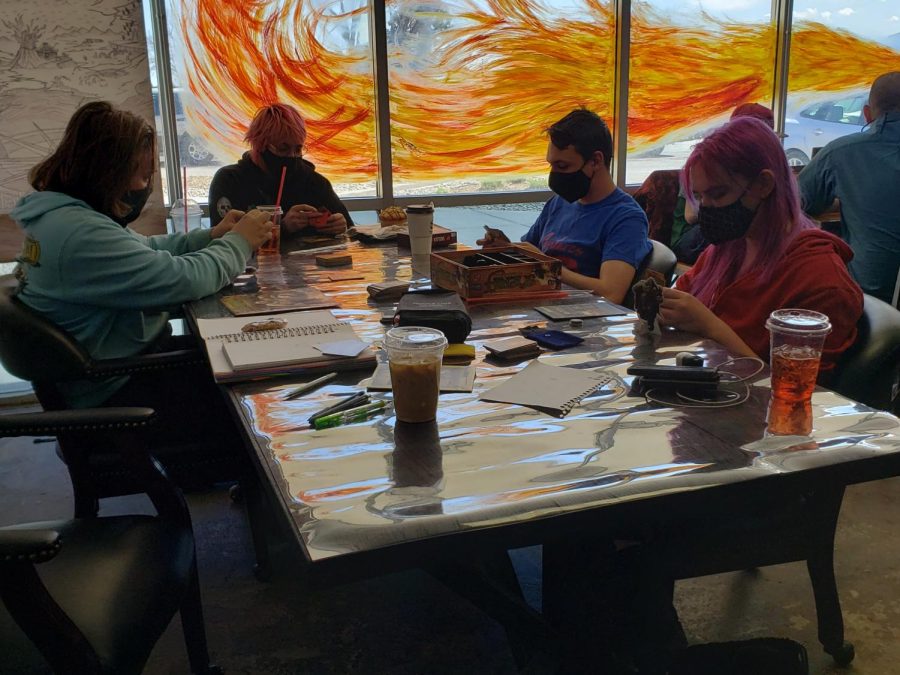Dungeons and Dragons: What Is It and Should You Play?
September 30, 2020
Dungeons and Dragons.
When you read that, what did you think? You might’ve had no reaction because you’ve never heard of Dungeons and Dragons (DnD or D&D), or you don’t know anything about it – that’s totally okay. Perhaps you had a bit of a negative or distasteful feeling. Or maybe you’re among the relative few who actually play DnD – in which case, you probably felt excited.
The truth is, most people fall under that first category: the ones that haven’t really seen or played it, and don’t know a whole lot about it.
Sure, you’ve probably seen it in Stranger Things, or heard of people that play it, but to you, it’s more of an idea or a name.
So, what is DnD?
It’s actually a lot simpler than you might think. A quick search of “Dungeons and Dragons” reveals that it is a “fantasy tabletop roleplaying game.” In other words, DnD is about roleplaying – or pretending to be – fictional characters in an (often) fantasy setting.
At its core, that remains very true. Stripped of all the mechanics and jargon, D&D is all about imagination and pretending. People often sit down for hours in groups of five to twenty people – sometimes even more – and speak and act like their own made-up characters. All the while, a Dungeon Master (or “DM”) controls the game and the world around the made-up characters, deciding how everything reacts to the characters’ decisions.
The great thing about it is that there isn’t a set way to play. Groups of players are always coming up with their own niched rules to suit their own vision of an ideal session, and in the culture of DnD, this is widely accepted as being completely okay; people encourage it, even.
However, the public opinion of DnD isn’t entirely positive, and hasn’t been since its creation.
The History
The game had a bit of a rough upbringing, but its fan-base has been and continues to be one of the most dedicated and active fan-bases of any franchise.
Since its initial publication in 1974, the game has seen many revisions and additions, including the highly-standardized “5th Edition” of the game, which was released in 2014 and is accepted by many as one of the most practical and down-to-earth versions of the game.
In fact, even before the game’s original version, there were other similar games whose elements were mashed together and altered to form DnD.
However, the game’s earlier editions definitely had their flaws.
A staff member of “Dungeons and Javas”, a local business made for D&D and similar games, explains this well during an interview. He explains that “when it was first created, [DnD] had so many rules and stipulations and practices that it turned up a lot of noses.” That, along with its heavy association with fantasy and magic and “imagination”, the game kicked off with a negative connotation from the public.
The idea of fantasy and imagination, especially around the time of the game’s release, was rather frowned upon by society; it was reserved for the minds of children and had an “elementary” idea tied to it. Superhero movies and comics were only just becoming common, and video-games where real world-building and roleplaying happened just weren’t there yet.
However, with the release of “5e”, or the modernized “5th Edition”, coupled with the insertion of it into pop-culture in places like Stranger Things, more and more people are beginning to try it, and they’re liking it.
When asked how he felt about the negative connotation of Dungeons and Dragons and its association with “nerdiness” in a bad way, the same staff member said “I think it used to; there are definitely remnants of it, but not as much anymore.”
A Game Worth Playing
So, if you’re someone that hasn’t tried Dungeons and Dragons, or if you believe that only weird and unsociable people play it, it’s time you sit down with a group of friends and try to have a session!
“Why should I, though?” you may ask.
There’s way more to DnD than just rolling dice and killing monsters. It’s a game about community, immersing yourself into new roles, and having an escape from reality to take a break from the daily stresses of life and enjoying some time with friends.
“What about the rules?”
The rules of DnD are not rules; they’re guidelines. If you’re having fun, you are winning at Dungeons and Dragons.
There are online resources to help you learn how to play. Obviously, YouTube or good ol’ Google can help, but the creators of D&D have published many books and resources to help players learn, including a Starter Set for a group of brand-new players try a pre-made campaign, as well as the Player’s Handbook, which can also be found online for free.
It also helps to find people that already know how to play and can explain all the useful knowledge to you. You can try Doherty’s own club, hosted by Mr. Badeau (though the details of this may vary this year because of COVID.) Or, don’t be shy to cross the street into the Dollar Tree/Dutch Bros plaza and try Dungeons and Javas, which hosts many sessions daily, and is always looking to teach new players.
But, maybe you’re not as worried about how to play; you’re thinking about why.
So, I asked my own group of D&D players (Juniors Orion Brody, Ashton Kidwell, and Sylvia Gonzalez) who’ve played together for roughly two years to give their opinions on what makes this game so fantastic, and they had plenty to say.
Everybody agreed that Dungeons and Dragons is a “surreal experience” that gives them an opportunity to feel “free” and to “let go of stress” by playing as characters that aren’t themselves. It’s helped them to “make friends”, “meet new people”, and “have a different take on the world around [them]”.
And there is truth to this. One of the few constants about D&D is that it is very close to impossible to play the game alone and get the same experience as with other people. It’s a game where people gather around a table and socialize and see each other face-to-face, which is beyond beneficial in a society where our time at home in front of a screen increases more and more.
The bottom line is: if you haven’t played the game, it’s a great opportunity to step out of your comfort zone and try something totally different. You just need some dice, a paper and pencil, and a group of friends! (Using dice on your phone works just as well, too)
Changing the Stigma
As a final note, I’d like to explain the purpose and message of this article.
Many people don’t understand DnD and feel that it’s “nerdy” or “weird” or “complicated”. But the game is anything but.
If you feel any of those things I just mentioned, reconsider your opinion. Try a game of DnD with an open mind. You will be blown away at just how fun and exciting it can be. If you play the game, be more open about it. Let the world know that it’s not such a bad game.
In other words, stop labeling a game that’s too broad to label. Let’s normalize this fun and awesome game! It can be so good for your mental health, and as a bonus, if you don’t like it, you’ve lost nothing at all.
P.S. – I’d like to thank Dungeons & Javas, a local business located next to Brush Crazy in the Dollar Tree plaza right by Doherty, for letting me interview them, as well as for being an awesome place to play D&D. If you want to try the game, get some good coffee, or want to meet other players, definitely give it a try.





